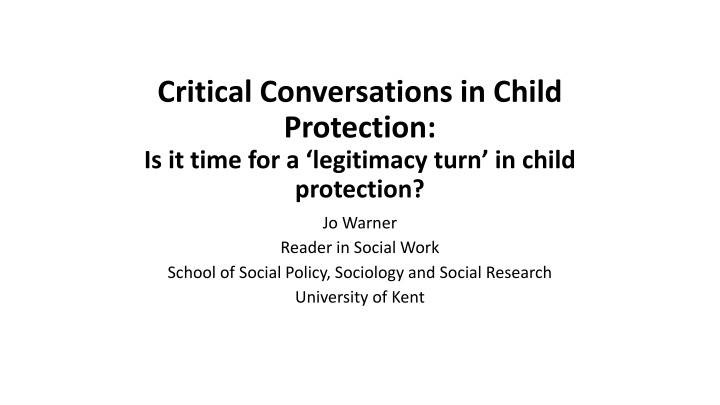
Legitimacy in Child Protection: Exploring State Power and Social Work Comparison
Delve into the concept of legitimacy within child protection as it relates to state power and social work, drawing comparisons to policing. Explore issues of fairness, distributive justice, and effectiveness in interventions for vulnerable children.
Download Presentation

Please find below an Image/Link to download the presentation.
The content on the website is provided AS IS for your information and personal use only. It may not be sold, licensed, or shared on other websites without obtaining consent from the author. If you encounter any issues during the download, it is possible that the publisher has removed the file from their server.
You are allowed to download the files provided on this website for personal or commercial use, subject to the condition that they are used lawfully. All files are the property of their respective owners.
The content on the website is provided AS IS for your information and personal use only. It may not be sold, licensed, or shared on other websites without obtaining consent from the author.
E N D
Presentation Transcript
Critical Conversations in Child Protection: Is it time for a legitimacy turn in child protection? Jo Warner Reader in Social Work School of Social Policy, Sociology and Social Research University of Kent
Focus is role of the state through statutory powers I argue that social work and the police bear comparison as state actors in their use of power with fellow citizens There has been a legitimacy turn in policing for some twenty-five years, particularly given disproportionality How should the concept of legitimacy apply to social work and child protection? For democratic social work?
Comparing the police and social work Use of power as street level bureaucrats (Lipsky 2010) Share tensions between care and control functions: social workers as soft cops and police as the secret social service (DV, mental health, CP) Expected to resolve problems (fighting crime, child rescue) when causes are far wider: the fallout of socio-economic and power inequalities (Reiner, 2016) Located differently in public sphere (policing by consent) and private sphere (the home visit )
Defining legitimacy Power can be said to be legitimate where it does not breach established rules; where its acquisition and exercise are normatively validated in terms of socially accepted beliefs about rightful authorisation and due performance; and where it is confirmed through appropriate acts of recognition and acknowledgement (Beetham, 1991, p.xiv)
Legitimacy and perceived fairness The shared values criterion for legitimacy is concerned with the perception of fairness in relation to: The distribution of resources (distributive justice) The quality of treatment people receive and the quality of decision-making (procedural justice) Effectiveness and performance
Distributive justice and child protection Analysis of the variable rates of care and protection interventions has shown that it is the social and economic circumstances of families that are the main determinants (see Child Welfare Inequalities Project, 2017) The investigative turn in social services, with an increase in investigations and in the proportion that proved unfounded Increased demand on service with fewer resources Socioeconomic inequality rather than standards of parenting alone is important determinant of state intervention
Procedural justice: quality of treatment and decision-making Mixed picture, with positives, but also practice that is experienced as cold-hearted demeaning and hurtful (Morris et al 2018) Processes that evoke or exacerbate feelings of shame and humiliation (Gibson, 2020) Deficit models of practice (Gupta et al 2018) Empathy at low levels (Lynch et al 2019) Court judgements provide useful window into quality of decision- making. Some positive but others critical.
Parenting and shared values: Threshold Criteria Tolerance for diverse standards of parenting is a defining feature of a democratic society: Basically it is the tradition of the UK, recognised in law, that children are best brought up within natural families It follows inexorably from that, that society must be willing to tolerate very diverse standards of parenting, including the eccentric, the barely adequate and the inconsistent. (Hedley J in Re L (Care: Threshold Criteria) [2007] 1 FLR 2050, para.50) Including: people who commit crimes, who abuse alcohol or drugs, who suffer from physical or mental illnesses or disabilities, or who espouse antisocial political or religious beliefs. (Munby Re A, Para.15) But, crucially, this does NOT = abandonment by the state: Local authorities must provide requisite assistance and support to enable families to continue to care for their child (beware libertarianism in arguments about legitimacy!)
Democratising research, policy and practice What are the public s informed, considered and collective views on the normative questions relating to parenting? (Aim for consensus or not?) How to establish critical friendship , so that social work is answerable to the communities it serves? (An enhanced role for local authorities?) Revisit social work s compelling history of democratic engagement. Extending the model of Family Group Conferencing? To read more: Warner, J (2021) Social work legitimacy: democratising research, policy and practice in child protection, Brit.J Social Work 52(4), pp1168-1185
